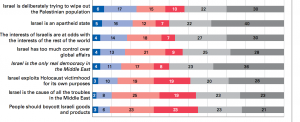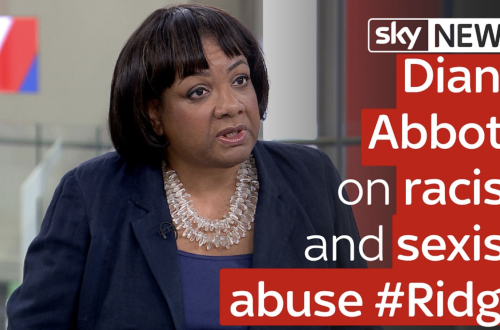The Jewish Policy Research report into antisemitism in the UK, prepared by Daniel L. Staetsky, and published in conjunction with the CST, functions as a kind of social media Rorschach test.
Some are flagging the link between antisemitism and anti-Israel sentiment, or the association between anti-Israel sentiment and the left, whereas others prefer to emphasise the fact that antisemitism correlates more strongly with the far right. Others zoom in on the higher incidence of antisemitism amongst Muslims.
Here are a few reflections on the findings.
Antisemitic ideas are not as marginal in Great Britain as some measures of antisemitism suggest, and they can be held with and without open dislike of Jews. (p. 4)
The report puts forward an ‘elastic’ view of antisemitism; only a tiny minority are actively and hostilely antisemitic, but many more may weakly hold a single antisemitic view, perhaps not understanding its significance. Thus, depending on quite how you set the threshold, you may decide that only about 3% of Britons are antisemitic, yet as many as 30% hold one antisemitic view.
A majority of those who hold anti-Israel attitudes do not espouse any antisemitic attitudes, but a significant minority of those who hold anti-Israel attitudes hold them alongside antisemitic attitudes. Therefore, antisemitism and anti-Israel attitudes exist both separately and together. (p. 5)
This is a complex issue. An anti-racist critic of Israel might want to point out that many of the questions testing attitudes to Israel were brushing up against antisemitic tropes. Someone might be trenchantly critical of Israel, a boycott supporter, while hesitating over giving affirmative answers to many of these questions.
Supporters of Israel might also, for different reasons, want to flag the controversial status of some of the anti-Israel statements used in the survey. (Edit: see for example Jonathan Hoffman here.) Although the survey acknowledged that many Jews would see some of these as antisemitic (e.g. on p. 65), at other times it seemed implicit that endorsing the anti-Israel statements was not, in itself, a possible mark of antisemitism. On a related note, those concerned by the way in which anti-Israel activism acts as a vector for antisemitism might wonder whether those avoiding agreeing with any blatantly antisemitic statements were on their guard, ensuring that:
our arguments can’t become polluted with charges of anti-Semitism
to quote Sarah Glynn, fisked here recently by David Collier.
But – to put a less cynical gloss on the fact that quite a few of Israel’s strongest critics got top marks for avoiding antisemitism – it’s worth considering that, just as many people sincerely find much anti-Israel discourse antisemitic, zealous critics of Israel may be sincerely opposed to antisemitism and shun conspiracy theories.
It was very interesting to look (p. 45) at the detailed charts correlating different degrees of strong and weak antisemitic and anti-Israel views with opinions across the political spectrum. (Note that all the graphs indicate an estimated range rather than a single figure).
The far left seems a little more antisemitic than the centre left, but no more so than the centre right. By contrast they are very anti-Israel, more so than the far right, although the far right is by far the most antisemitic grouping.
This was an interesting passage:
Levels of antisemitism among those on the left-wing of the political spectrum, including the far-left, are indistinguishable from those found in the general population. Yet, all parts of those on the left of the political spectrum – includingthe ‘slightly left-of-centre,’ the ‘fairly left-wing’ and the ‘very left-wing’ – exhibit higher levels of anti-Israelism than average. (p. 6)
This finding has perhaps been rather flattened in some reporting. Here, for example, this piece in Algemeiner, by simply noting the anti-Israel/antisemitism link and pairing it with the anti-Israel/left link, allows the reader to infer a correlation between antisemitism and the left:
Critically, the report demonstrates that “the stronger a person’s anti-Israel views, the more likely they are to hold antisemitic attitudes,” noting as well that “all parts of those on the left of the political spectrum – including the ‘slightly left-of-centre,’ the ‘fairly left-wing’ and the ‘very left-wing’ – exhibit higher levels of anti-Israelism than average.”
This is perhaps where definitions and boundaries complicate the issue. As noted above, many would feel that some of the ‘anti-Israel’ statements used in the survey are at least borderline antisemitic, and might still be wary of someone who subscribed to many of these positions, even if they disassociated themselves from the crudely antisemitic statements. However the findings seem to demonstrate that Israel’s opponents on the left are better at uncoupling their critiques from overt racism, whereas for those on the far right opposition to Israel is probably a function of racism.
A useful parallel might be drawn with attitudes to Islam. It’s a complex spectrum, but my guess is that a similar survey would throw up a greater association between critical views of Islam and racism on the far right than on the left.
I was surprised by the low level of support for boycotts evidenced in the survey, and puzzled by the fact that fewer supported boycotts than agreed with a series of quite troubling statements about Israel (p. 29).
When the survey looked more closely at the intersection between antisemitism and religion, only Muslim respondents differed markedly from the national average, demonstrating elevated levels of both antisemitism and anti-Israel views, particularly when they also identified as religious and observant rather than secular. This finding seems broadly in line with other recent surveys.
Update: Jonathan Hoffman has written a follow up piece to his earlier post (linked to above) which addresses the problematic nature of the ‘anti-Israel’ statements in the survey.



